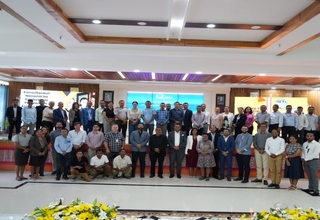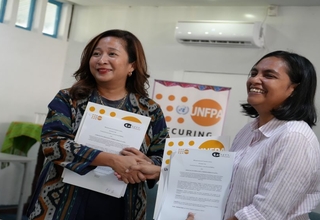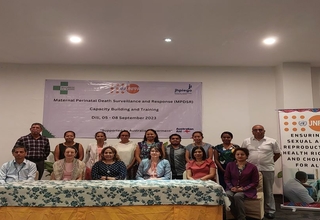Family planning: empowering people, developing nations
Dr. Natalia Kanem
Acting Executive Director
UNFPA, the United Nations Population Fund
11 July 2017
Every day, vulnerable women, especially those who are poor and are refugees, face social, economic and geographic obstacles to voluntary family planning services and information.
Fifty years ago today, the then-Secretary-General of the United Nations established UNFPA, the United Nations Population Fund, as a trust fund. And since 1969, when UNFPA began operations, it has been helping to remove obstacles to family planning and to enable women to exercise their reproductive rights. UNFPA contributed to a near doubling of modern contraceptive use worldwide, from 36 per cent in 1970 to 64 per cent in 2016.
Despite the dramatic progress, enormous challenges remain: some 214 million women in developing countries lack safe and effective family planning methods. Most of these women live in the 69 poorest countries. Fulfilling their unmet demand would save lives by averting 67 million unintended pregnancies and reducing by one third the estimated 303,000 annual maternal deaths.
Better reproductive health care, including voluntary family planning, can bolster economies and contribute to sustainable development by empowering women to complete their education, join the paid labour force, be more productive in their jobs, earn higher incomes and increase savings and investments. In addition, for each additional dollar spent on contraceptive services above the current level, the cost of pregnancy-related care is reduced by $2.30.
Investments in family planning help lead to prosperity for all.
Family planning, therefore, is critical to achieving Sustainable Development Goal 1, to end poverty. It is also key to achieving other Goals, such as ending hunger as well as promoting good health and gender equality.
UNFPA has set an ambitious, transformative goal to eliminate all unmet demand for family planning by 2030. On this World Population Day, we call on all governments and stakeholders to help achieve this goal. UNFPA also calls on the 179 governments that endorsed the Programme of Action of the 1994 Cairo International Conference on Population and Development to fulfill their commitments to achieve universal access to sexual and reproductive health, including voluntary family planning. Not only is this a matter of protecting health and rights, but it is also a matter of investing in economic development as well as humanity's prosperity and progress.
Tetum Version
MENSAJEN BA LORON MUNDIAL POPULASAUN 2017
Planeamentu familiar: hakbi'it ema, dezenvolve nasaun
Dr. Natalia Kanem
Direitora Ezekutiva Interina
UNFPA, Fundus Nasoens Unidas ba Populasaun
11 Julhu 2017
***
Kada loron, feto vulnerabel sira, liu-liu sira ne'ebé mak kiak no refujiadu, enfrenta obstaklus sosial, ekonomia no jeográfiku ba serbisu no informasaun voluntáriu kona ba planeamentu familiar.
Tinan 50 liu ba, Sekterariu Jeral Nasoens Unidas sesante estabelese UNFPA, Fundus Nasoens Unidas ba Populasaun, hanesan fundus de seguransa nian. No dezde 1969, bainhira UNFPA hahu halo operasaun, UNFPA ajuda atu hasai tiha obstaklus ba planeamentu familiar no hakbi'it feto sira atu ezerse sira nia direitu reprodutiva. UNFPA kontribui mós ba kuaze fornese uzu kontraseptivu modernu ba mundu tomak, husi 36 pursentu iha 1970 to'o 64 pursentu iha 2016.
Maske iha progresu makas, maibé sei iha nafatin obstaklus lubuk sira: hamutuk feto sira millaun 214 iha nasaun hirak ne'ebé maka sei dezenvole hela sei menus ba métodu planeamentu familiar ne'ebé mak seguru no efetivu. Responde ba sira nia nesesidade planeamenu familiar ne'ebé la hetan sei salva isin-rua ne'ebé la hakarak millaun 67 no hamenus um tersu mortalidade maternal kada tinan 303,000.
Kuidadus saúde reprodutiva ne'ebé diak liu, inklui planeamentu familiar bele hadia ekonomia no kontribui ba dezenvolvimentu sustentabel liu husi hakbi'it feto sira kompleta sira nia edukasaun, tama ba iha forsa traballu serbisu, sai produtivu liu iha sira nia serbisu, hetan rendimentu diak liu no hasae poupansa no investimentu. Nune'e mos, ba kada dolar ida ne'ebé gasta ba fornesimentu kontraseptivu liu nivel agora, kustu ba isin-rua sei hamenus ba $ 2.30.
Investimentu iha planeamentu familiar bele ajuda lori ba prosperiadade ba ema hotu.
Planeamentu familiar,ne'e duni, mak kritiku tebes atu atinji Objetivu Dezenvolvimentu Sustentabel 1, hapara kiak. Nune'e mos xave atu atinji Objetivu sira seluk, hanesan hapara hamlaha nune'e mos saúde diak no igualdade jeneru.
UNFPA estabelese tiha ona objetivu ne'ebe ambisioza, transformativu atu halakon nesesidade planeamentu familiar ne'ebé la-hetan iha tinan 2030. Iha loron Mundial Populasaun, ami bolu atensaun ba governu sira no parseiru sira hotu atu ajuda alkansa objetivu ne'e. UNFPA mos bolu atensaun ba governantes nasaun 179 ne'ebé mak aprova Programa Asaun 1994 iha Konferensia Internasional Cairo kona ba Populasaun no Dezenvolvimentu atu hatan sira nia komitmentu atu atinji asesu universal ba saúde seksual no reprodutiva, inklui planeamentu familiar voluntáriu. Lós ida ne'e deit mak sai prekupasaun ba proteje saúde no direitu sira, maibé ida ne'e mos prekupasaun investe ba dezenvolvimentu ekonomia nune'e mos prosperiade humanidade no progresu sira.




